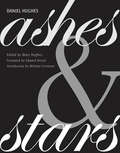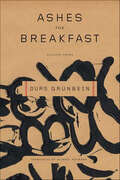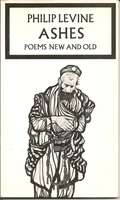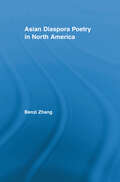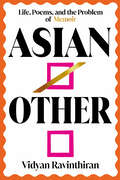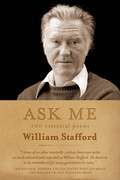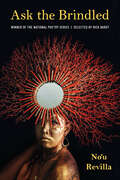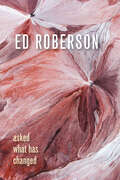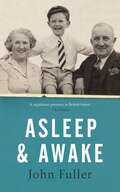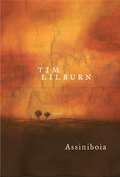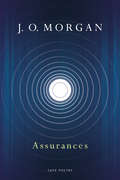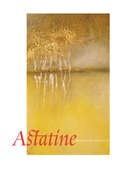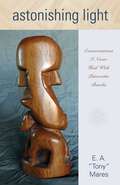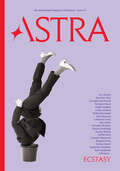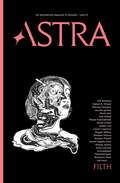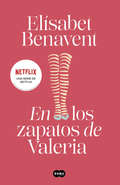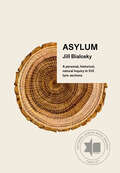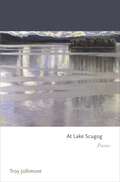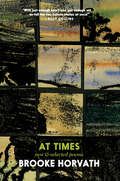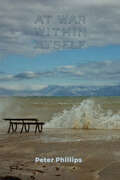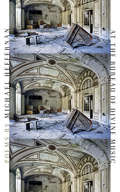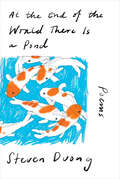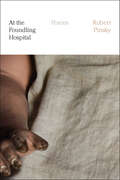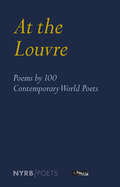- Table View
- List View
Ashes & Stars
by Edward Hirsch Daniel Hughes Mary Hughes Michael ScrivenerFifty-five of Daniel Hughes's final poems, containing distinctly insightful and literate meditations on themes of love, art, and hope.
Ashes for Breakfast: Selected Poems
by Durs GrünbeinThe first English translation of Germany's leading contemporary poet....what is the whole surreal jokeshopof terrors compared to theinfinitely chance littletricks of a poem.--from "MonoLogical Poem #1"Born in Dresden in 1962, Durs Grünbein is the most significant and successful poet to emerge from the former East Germany, a place where, he wrote, "the best refuge was a closed mouth." In unsettling, often funny, sometimes savage lines whose vivid images reflect his deep love for and connection with the visual arts, Grunbein is reinventing German poetry and taking on the most pressing moral concerns of his generation. Brilliantly edited and translated by the English poet Michael Hofmann, Ashes for Breakfast expertly introduces Germany's most highly acclaimed contemporary poet to American readers.
Asian Diaspora Poetry in North America (Literary Criticism and Cultural Theory)
by Benzi ZhangPresenting a new way of reading that helps us discern some previously unnoticed or unnoticeable features of Asian diaspora poetry, this volume highlights how poetry plays a significant role in mediating and defining cross-cultural and transnational positions. Asian diaspora poetry in North America is a rich body of poetic works that not only provide valuable material for us to understand the lives and experiences of Asian diasporas, but also present us with an opportunity to examine some of the most important issues in current literary and cultural studies. As a mode of writing across cultural and national borders, these poetic works challenge us to reconsider the assumptions and meanings of identity, nation, home, and place in a broad cross-cultural context. In recent postcolonial studies, diaspora has been conceived not only as a process of migration in which people crossed and traversed the borders of different countries, but also as a double relationship between different cultural origins. With all its complexity and ambiguity associated with the experience of multi-cultural mediation, diaspora, as both a process and a relationship, suggests an act of constant repositioning in confluent streams that accommodate to multiple cultural traditions. By examining how Asian diaspora poets maintain and represent their cultural differences in North America, Zhang is able to seek new perspectives for understanding and analyzing the intrinsic values of Asian cultures that survive and develop persistently in North American societies.
Asian/Other: Life, Poems, and the Problem of Memoir
by Vidyan RavinthiranA perceptive exploration of poetry, race, and otherness from one of our most promising voices in criticism. Vidyan Ravinthiran was born in the north of England to Sri Lankan Tamils, and moved to the United States five years ago. Considering identity in both its political and psychological senses, he leaps adventurously between memoir and criticism, understanding his life through poetry, and vice versa. Ranging from Andrew Marvell to Divya Victor, Ravinthiran writes both about and through poems, discussing Sri Lanka; experiences of racism and resilience; intergenerational trauma; pandemic parenting in an autism family; relationships shaped by the internet; growing up with a speech impediment and being sent by one’s aspirational brown parents to elocution lessons; and the relative invisibility of South Asians in Western television and film. This electric, compelling hybrid memoir discovers a new way of writing about the self and also literature.
Ask Me: 100 Essential Poems of William Stafford
by William Stafford"In our time there has been no poet who revived human hearts and spirits more convincingly than William Stafford." —Naomi Shihab NyeSome time when the river is ice ask memistakes I have made. Ask me whetherwhat I have done is my life. —from "Ask Me"In celebration of the poet's centennial, Ask Me collects one hundred of William Stafford's essential poems. As a conscientious objector during World War II, while assigned to Civilian Public Service camps Stafford began his daily writing practice, a lifelong early-morning ritual of witness. His poetry reveals the consequences of violence, the daily necessity of moral decisions, and the bounty of art. Selected and with a note by Kim Stafford, Ask Me presents the best from a profound and original American voice.
Ask the Brindled
by No'u RevillaAsk the Brindled, selected by Rick Barot as a winner of the 2021 National Poetry Series, bares everything that breaks between “seed” and “summit” of a life—the body, a people, their language. It is an intergenerational reclamation of the narratives foisted upon Indigenous and queer Hawaiians—and it does not let readers look away. In this debut collection, No‘u Revilla crafts a lyric landscape brimming with shed skin, water, mo‘o, ma‘i. She grips language like a fistful of wet guts and inks the page red—for desire, for love, for generations of blood spilled by colonizers. She hides knives in her hair “the way my grandmother—not god— / the way my grandmother intended,” and we heed; before her, “we stunned insects dangle.” Wedding the history of the Kingdom of Hawai?i with contemporary experiences of queer love and queer grief, Revilla writes toward sovereignty: linguistic, erotic, civic. Through the medium of formal dynamism and the material of ?Oiwi culture and mythos, this living decolonial text both condemns and creates. Ask the Brindled is a song from the shattered throat that refuses to be silenced. It is a testament to queer Indigenous women who carry baskets of names and stories, “still sacred.” It is a vow to those yet to come: “the ea of enough is our daughters / our daughters need to believe they are enough.”
Asked What Has Changed (Wesleyan Poetry Series)
by Ed RobersonA Black ecopoet observes the changing world from a high-rise window, &“ever alert to affinities between the small and the vast, the fleeting and the cosmic&” (James Gibbons, Hyperallergic). Award-winning poet Ed Roberson confronts the realities of an era in which the fate of humanity and the very survival of our planet are uncertain. Departing from the traditional nature poem, Roberson's work reclaims a much older tradition, drawing into poetry&’s orbit what the physical and human sciences reveal about the state of a changing world. These poems test how far the lyric can go as an answer to our crisis, even calling into question poetic form itself. Reflections on the natural world and moments of personal interiority are interwoven with images of urbanscapes, environmental crises, and political instabilities. These poems speak life and truth to modernity in all its complexity. Throughout, Roberson takes up the ancient spiritual concern—the ephemerality of life—and gives us a new language to process the feeling of living in a century on the brink.
Asleep and Awake
by John FullerAn elegantly jubilant and personal new collection celebrating love, life and creativity from award-winning poet and Booker Prize-shortlisted novelist, John FullerIn this personal and characteristically brilliant new collection from John Fuller, an abundance of memories abound. From “those once endless years” of a childhood in wartime – tasting of Granny’s chicken soup, twizzers and cherry-go-rips – to the pattern of family and friendships, important milestones are brought to vivid life. In ‘Before We Met – and After’ a sequence of recollections cherish a wife on her eightieth birthday; ‘In Whose Head’ a piece by Schumann is revisited through advancing years; and in ‘Keeper of the Fire’ and ‘In Memory of John Bayley’ late poems of remembrance memorialise lost friends. These are poems of being and time, full of lyric feeling and Fuller’s distinctive wit and lightness of touch. Alive with the clang and sway of the “chosen colours of daily family life”, together they form a resonant gathering of poems that celebrate, with thoughtfulness and joy, “the feel and length of our lives”.
Assiniboia
by Tim LilburnFrom Governor General's Award-winning poet Tim Lilburn comes a new collection of poetry of great scope and ambition. Assiniboia is a richly textured imagining of a Western Canada that could have been. Theatrical, operatic -- a masque and a pair of choral performances -- the book breaks new formal ground in Canadian poetry. The huge spectacle of Tim Lilburn's eighth collection gives us a new land peopled by figures from the visionary governments of Louis Riel and from the western mysticism, as well as land forms with the power of speech, all acting together as a kind of ghostly army bent on overturning more than a century of colonial practice.
Assurances
by J. O. Morgan**WINNER OF THE COSTA POETRY AWARD 2018****SHORTLISTED FOR THE 2018 FORWARD PRIZE FOR BEST COLLECTION**A war-poem both historic and frighteningly topical, Assurances begins in the 1950s during a period of vigilance and dread in the middle of the Cold War: the long stand-off between nuclear powers, where the only defence was the threat of mutually assured destruction.Using a mix of versed and unversed passages, Morgan places moments of calm reflection alongside the tensions inherent in guarding against such a permanent threat. A work of variations and possibilities, we hear the thoughts of those involved who are trying to understand and justify their roles. We examine the lives of civilians who are not aware of the impending danger, as well as those who are. We listen to the whirring minds of machines; to the voice of the bomb itself. We spy on enemy agents: always there, always somewhere close at hand.Assurances is an intimate, dramatic work for many voices: lyrical, anxious, fragmentary and terrifying; a poem about the nuclear stalemate, the deterrent that is still in place today: how it works and how it might fail, and what will vanish if it does.
Astatine
by Michael KenyonAstatine is an Italian girl, who like Dante's Beatrice, haunts the narrator of Michael Kenyon's incandescent fourth book of poetry. Named after a radioactive element whose isotopes endure half-lives of mere seconds, she is simultaneously a disappearing and abiding presence who cajoles and comforts, who questions and points, who often leaves the poet puzzled, electrified, heart-broken, and wanting more. Astatine is Kenyon's meditation on the evanescent and persevering tragedy of our lives on Earth. He takes us on an inspirational journey through time that embraces all we are born to and must too soon let go of, even as we make peace with the ever-changing fortunes of existence, even as we come upon unexpected joy.
Astitva ki Asmita: अस्तित्व की अस्मिता
by Dr Ghanshyam Asudaniअस्तित्व की अस्मिता विभिन्न सामाजिक मुद्दों पर आधारित 18 हिंदी लघु कथाओं का संग्रह है। लेखक ने महिलाओं के विशेष संदर्भ में समाज के कमजोर वर्गों के शोषण को प्रदर्शित करने का प्रयास किया है। कहानियाँ विभिन्न सामाजिक मुद्दों को सबसे संवेदनशील तरीके से प्रस्तुत करती हैं।
Astonishing Light: Conversations I Never Had with Patrociño Barela
by E.A. MaresE. A. Mares never crossed paths with the great New Mexico sculptor Patrociño Barela, but the conversations he imagines with this gifted Taos artist (c. 1900–1964) are uncannily vivid and persuasive. Readers of Mares's play about Padre Martínez, another historic Taoseño, know that Mares was able to channel spirits. The poet and the ghost of the sculptor, conversing like two old men at the Geronimo Lounge, find much in common. For readers unfamiliar with Barela's art, photographer Miguel Gandert and artist Frank McCulloch have contributed illustrations to bring his magnificent expressionist carvings to life. So we begin, all languages being equal. The language of dreams, the sinuous curves in the language of curved wood. The language of desire, of music, of words moist with love. . . . So we start with the wood, Patrociño, or the word. Our raw materials here, in your workshop, where the pot-bellied stove keeps out the dark and cold of winter. Music, of words moist with love.
Astra Magazine, Ecstasy: Issue One
by Nadja SpiegelmanAstra Magazine is the new literary magazine of the moment, a must-read for anyone interested in the most vital contemporary literature from around the world. Astra Magazine connects readers and writers from New York to Mexico City, Lagos to Berlin, Copenhagen to Singapore and beyond around a unified aesthetic that highlights the luxurious pleasures of reading. Each issue contains prose, poetry, art and comics, artfully produced on silky smooth paper with luxurious French flaps. The Ecstasy Issue contains work by Mieko Kawakami, Fernanda Melchor, Catherine Lacey, Leslie Jamison, Solmaz Sharif, Terrance Hayes, Don Mee Choi, Ada Limón, Chinelo Okparanta, Sayaka Murata, Katharina Volckmer, Kate Zambreno, and many more.
Astra Magazine, Filth: Issue Two
by Nadja SpiegelmanAstra Magazine is the new literary magazine of the moment, a must-read for anyone interested in the most vital contemporary literature from around the world. Astra Magazine connects readers and writers from New York to Mexico City, Lagos to Berlin, Copenhagen to Singapore and beyond. Each issue contains prose, poetry, art and comics, artfully produced on silky smooth paper with luxurious French flaps. It's the most covetable accessory of the fall — dark and playful, pretty and smart. The Filth issue features work by Elif Batuman, Sheila Heti, Raven Leilani, Aracelis Girmay, Samuel R. Delany, Brontez Purnell, Wayne Koestenbaum, Clarice Lispector, McKenzie Wark, Mariana Enríquez, Safiya Sinclair, Maggie Millner, and many more.There is a moral element to filth. It is both what we have been taught to hide, and the subversive pleasure in revealing it. Many of the writers in this issue are queer or trans or otherwise outsiders. When you are taught that an intrinsic part of you is shameful, you find power in that shame. All that filth, compressed by the pressure, sparkles like diamonds when it is let it into the light. Have you ever felt the relief of telling your own secrets? There&’s a reason why people revel in their own filth. It&’s a place for reveling
Astro Poets: Tu guía del Zodiaco
by Dorothea Lasky Alex DimitrovEl primer gran manual de astrología del siglo XXI es divertido y útil, está salpicado de versos, contiene un mundo para cada signo y ¡llega de la mano del fenómeno Astro Poets! Si alguna vez te has preguntado por qué tu amiga géminis no te deja mediar palabra cuando salís a tomar algo, cuándo el «¿Sigues despierto?» que te escribe esa escorpio a las dos de mañana se convertirá en algo más (spoiler: no va a pasar), o cómo es que tu novio cáncer se deshace en lágrimas con los anuncios de pañales, estás en el lugar adecuado. En estas páginas llenas de grandes dosis de información, consejos, humor, lirismo y poesía, los Astro Poets te ayudarán a leer lo que han escrito las estrellas sobre ti para que lo uses a la hora de lidiar con tus amistades, tu carrera y tu complicada (¡o no!) vida amorosa. La crítica ha dicho...«Los Astro Poets iluminan internet.»The New York Times «Una guía deastrología como no has visto otra igual.»Bustle «Dimitrov y Lasky saben de lo que hablan y tienen un don para hacer que el etéreo mundo de la astrología parezca claro y cercano.»Vogue «Los lectores que quieran saber más sobre su signo quedarán encantados con este espléndido manual.»Publishers Weekly «Ha surgido una nueva voz popular en el firmamento del horóscopo, y tiene algo de la sensibilidad de Piscis y de la férrea autoestima de Leo, y es ingeniosa y amorosa.»Elle «El mapa astrológico definitivo... Un curso intensivo perfecto para principiantes, a la vez lírico, ingenioso y con el conocimiento suficiente para cautivar incluso a los ya iniciados.»Booklist «Una guía de signos divertida, accesible y supermoderna. Ricemos el rizo, ¡es astrología escrita por poetas! Si alguna vez te has preguntado qué dice tu horóscopo de ti (o cómo puede ayudarte a entender a los que te rodean), deberías empezar por aquí.»BookRiot
Asylum: A personal, historical, natural inquiry in 103 lyric sections
by Jill BialoskyThis book-length sequence by the critically acclaimed poet is a seeker's story, revealing personal and historical traumas and how we search for understanding and meaning in their wake.In Asylum, poet Jill Bialosky embarks on a Virgilian journey, building a narrative sequence from 103 elegant poems and prose sections that cohere in their intensity and their need to explore darkness and sustenance both. Taken together, these piercing pieces--about her nascent calling as a writer; her sister's suicide and its still unfolding aftermath; the horror unleashed by World War II; the life cycle of the monarch butterfly; and the woods where she seeks asylum--form a moving story, powerfully braiding despair, survival, and hope. Bialosky considers the oppositions that govern us: our reason and unreason, our need to preserve and destruct. "What are words when they meet the action of what they attempt to modify?" she asks, exploring the possible salve of language in the face of pain and grief. What Asylum delivers is a form of hard-won grace and an awareness of the cost of extreme violence, inexplicable loss, and the miraculous cycles of life, in work that carries Bialosky's art to a new level of urgency and achievement.
At Lake Scugog: Poems (Princeton Series of Contemporary Poets #58)
by Troy JollimoreThis is an eagerly awaited collection of new poems from the author of Tom Thomson in Purgatory, which won the National Book Critics Circle Award and was hailed by the New York Times as a "snappy, entertaining book." A triumphant follow-up to that acclaimed debut, At Lake Scugog demonstrates why the San Francisco Chronicle has called Troy Jollimore "a new and exciting voice in American poetry." Jollimore is a professional philosopher, and in witty and profound ways his formally playful poems dramatize philosophical subjects--especially the individual's relation to the larger world, and the permeable, constantly shifting border between "inner" and "outer." For instance, the speaker of "The Solipsist," suspecting that the entire world "lives inside of your skull," wonders "why / God would make ear and eye / to face outward, not in." And Tom Thomson--a character who also appeared in Jollimore’s first book--finds himself journeying like an astronaut through the far reaches of the space that fills his head, an experience that prompts him to ask that a doorbell be installed "on the inside," so that he can warn the world before "intruding on’t."______ From At Lake Scugog:LOBSTERS Troy Jollimore ? tend to cluster in prime numbers, sub-oceanic bundles of bug consciousnesssubmerged in waking slumber, plunged in pitsof murk-black water. They have coalesced out of the pitch and grime and salt suspendedwithin that atmospheric gloom. Their skinis colorless below. But when exposedto air, they start to radiate bright green, then, soon, a siren red that wails: I’m dead.The meat inside, though, is as white as teeth,or the hard-boiled egg that comes to mindwhen one cracks that crisp shell and digs beneath. Caress the toothy claw-edge of its pincerand you will know the single, simple thoughtthat populates its mind. The lobster trap is eleganceitself: one moving part: the thing that’s caught.
At Times: New and Selected Poems
by Brooke HorvathOver thirty years of poems from an American poet in the spirit of Alan Dugan and Nelson Algren's Chicago: City on the Make."At times . . . I wanted to be a poet." A fittingly sly and humble epigraph for this half- a- lifetime's worth of sly and humble, and also lyrical and joyous, poems. From the first poem in the collection, "The Woman in the Peter Pan Collar," in which the poet examines an old photograph of his mother, searching for clues, to the last, "Rainouts," in which he beseeches the Lord to let his own death take place on the sort of day that strands baseball games mid-inning, leaving "all final decisions happily deferred," Brooke Horvath is always intimate, never rhetorical or bland. This is poetry not just for the sake of poetry, but poetry as a way of life, of engaging with the world. Like the works of Alan Dugan or Galway Kinnell, these are poems of the everyday and, when read slantwise, of what lies beyond. The whole collection, in fact, is imbued with the wily double meaning of the final couplet from "What in the World Were We Thinking Of?"--"It was a day when nothing happened / that we will find worth remembering."
At War Within Myself
by Peter Phillips“If you are not into poetry, this book may change your mind. Like many people, I was put off poetry at school – over 50 years ago now – by a teacher who threatened (and carried out) ‘the slipper’ to any boy who could not recite his favourite poem off by heart. Having gone through life never realising or understanding the sweet nuances of poetry, I missed out on a whole raft of literature. It took my terminal illness to make me understand that, through poetry, one can have the imagination stirred to such a degree, that your whole view on life can be change in an instant. Climate change, poverty, homelessness. Illness, and now pandemic, are all part of life today. Also, to have a Faith can change one’s attitude to life. The poems in this book highlight the cruelty and compassion of life, the wonder of creation. If we don’t do something pretty quickly, we will lose it… But also to laugh at life can be a great tonic. To put faith and trust in a ‘Higher Power’ will help get us all through it.” Peter Phillips
At the Bureau of Divine Music: At The Bureau Of Divine Music
by Michael HeffernanA thoughtful and elegant collection from accomplished poet Michael Heffernan.
At the End of the World There Is a Pond: Poems
by Steven DuongA stunning debut volume infused with apocalyptic overload, beginnings and endings, and all the ways we betray ourselves. At the End of the World There Is a Pond is a book about aftermaths. Each poem comes in the wake of a deep rupture—the ruptures of mental illness and addiction, of migration and displacement, of violence, familial conflict, and ecological catastrophe—and yet the speakers engage with despair and playfulness in equal measure, always allowing humor, irony, and the exuberance of contemporary life to bend darkness toward something like hope. Again and again, Steven Duong’s writing excavates the unnatural conditions of a seemingly natural world, asking us to pay studied attention to its inhabitants. His poems force us to keep looking: at the betta fish trapped in its mason jar, the forest choked by invasive kudzu, the elephant wounded in a landmine blast. Through its relentless scrutiny and exacting care, this magisterial debut collection poses an impossible question: How can we reconcile a deep love for the world, in all its buzzing, wriggling aliveness, with an equally deep, self-destructive desire to leave it behind?
At the Foundling Hospital: Poems
by Robert Pinsky“Since the death of Robert Lowell in 1977, no single figure has dominated American poetry the way that Lowell, or before him Eliot, once did . . . But among the many writers who have come of age in our fin de siècle, none have succeeded more completely as poet, critic, and translator than Robert Pinsky.” —James Longenbach, The NationWith all the generosity and mastery we have come to expect from out three-time Poet Laureate, Robert Pinsky has written a bold, lyrical meditation on identity and culture as hybrid and fluid, violent as well as creative: the enigmatic, maybe universal, condition of the foundling. At the Foundling Hospital considers the foundling soul: its need to be adopted, and its need to be adaptive. These poems reimagine identity on the scale of one life or of human history: from “the emanation of a dead star still alive” to the “pinhole iris of your mortal eye.” What is a particular person? How unique? What is anyone born as? Born with? Born into? The poems of Robert Pinsky’s At the Foundling Hospital engage personality and culture as improvised from loss: a creative effort so pervasive it can be invisible.
At the Louvre: Poems by 100 Contemporary World Poets
by Antoine CaroNew poems from 100 of the world&’s brightest contemporary poets, all about a common subject: the Louvre—exploring the many pleasures, provocations, and surprises that the museum and its collection inspire.Of the world's great museums, the Louvre is the most encompassing, a sumptuous collection that includes not only some of the most celebrated works of art of all time, but fascinating, perplexing, splendid, and beautiful objects of all kinds, all housed in a building, itself monumental, that was once the seat of the kings of France. In the grand corridors and multiplying backrooms of the Louvre, the history of the world and the history of art and the history of how we look and think about art and its place in our lives challenge and delight us at every corner. Few other public spaces are at once so haunted and so alive.A unique collaboration between New York Review Books and the Louvre Museum, At the Louvre presents a hundred poems, newly commissioned exclusively for this volume, by a hundred of the world's most vibrant poets. They write about works from the museum's collection. They write about the museum and its history. They write what they see and feel, and together they take us on a tour of the museum and its galleries like no other, one that is an irresistible feast for the ear and mind and eye.Some of the poets in At the Louvre: Simon Armitage; Barbara Chase-Riboud; Hélène Dorion; Jon Fosse; Fanny Howe; Kenneth Goldsmith; Lisette Lombé; Tedi López Mills; Precious Okoyomon; Charles Pennequin; Blandine Rinkel; Yomi Şode; Krisztina Tóth; Jan Wagner; Elizabeth Willis.
